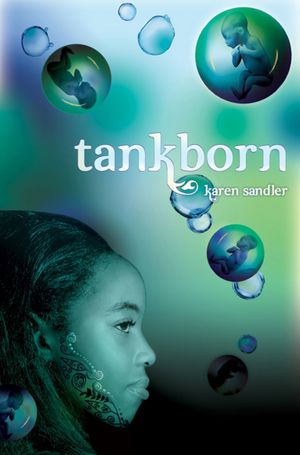Kayla hunched on the bank of the Chadi River while below her, Jal, her slender, black-skinned nurture brother, skipped from one deep pool of the river to another, searching for sewer toads.
What I liked best about Tankborn was the world-building. Sandler challenges readers with it in places, which I thought was a good thing. The society and culture, the vocabulary, it took work. Both to read and to create. But that is one of the more enjoyable elements of speculative fiction (both in science fiction and fantasy) visiting a place--a world--so unlike our own.
Tankborn is set on another planet. And our heroine(s) are two young women that have been genetically engineered. (Their genes have been spliced--animal DNA has been added to human DNA. One of our heroines "sket" is nurturing (I believe the book mentioned this coming from dolphins?) and the other heroine's strength is strength (I can't remember which animal this comes from.) In this society, those that are 'tankborn' are called GEN. The "N" stands for non-human, or does it?! So these GENs aren't even worth being the lowest of the low in the caste system. They're bred--artificially, of course--for servitude, for slavery. They are raised by nurturers. When they're fifteen, each receives an assignment.
Kayla and Mishalla are our two heroines. The story begins with Kayla's story, but soon Mishalla's story becomes an essential element.
I do NOT want to say too much about this one!!! I thought it was a compelling read, and as is often the case with science fiction, it is best to read this one without knowing too much.
Read Tankborn
- If you're a fan of science fiction, particularly if you're interested in genetic engineering
- If you're a fan of books set on another planet
- If you're interested in social development, the development of different cultures, societies, caste systems, etc.
- If you're a fan of dystopias
- If you like a little romance with your science fiction (while romance doesn't dominate the story, it is definitely present)
- If you're looking for multicultural science fiction (POC characters)
- If you don't mind new (created) vocabulary in your science fiction
© 2012 Becky Laney of Becky's Book Reviews
